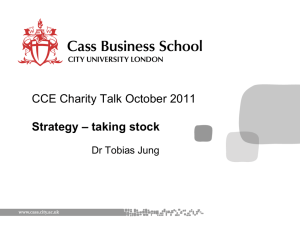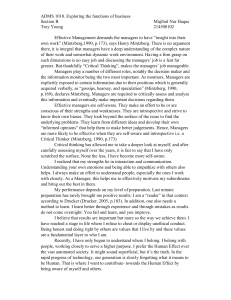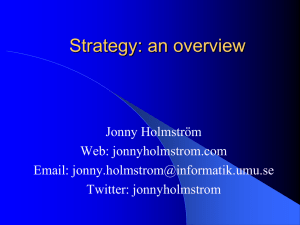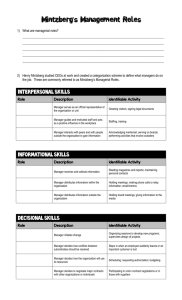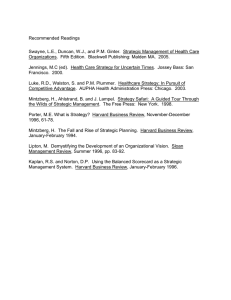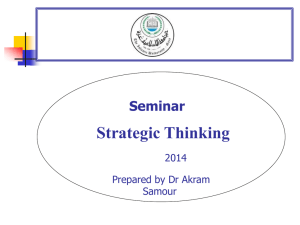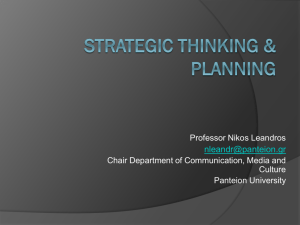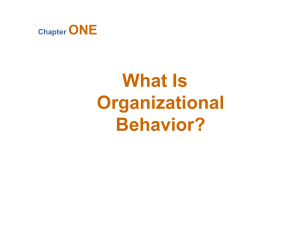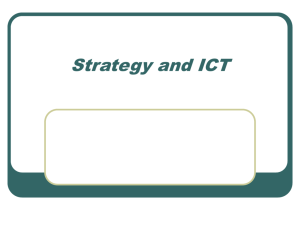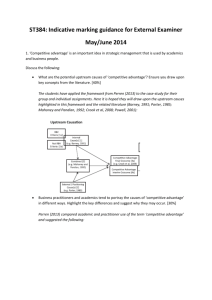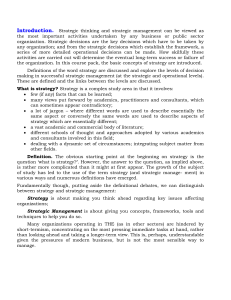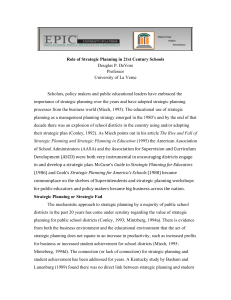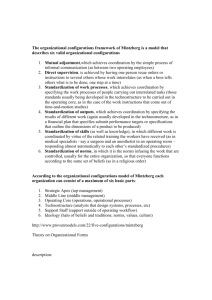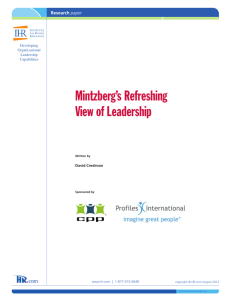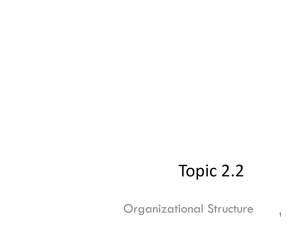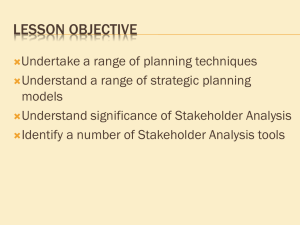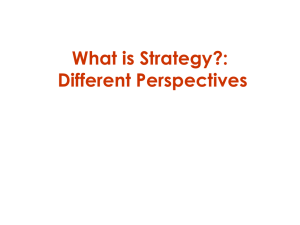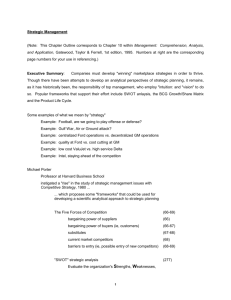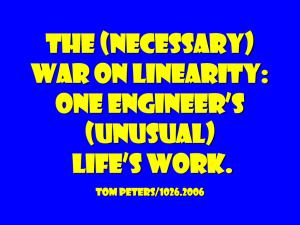Chapter 1 (Updated) - Miles A. Zachary, Ph.D. || Homepage
advertisement
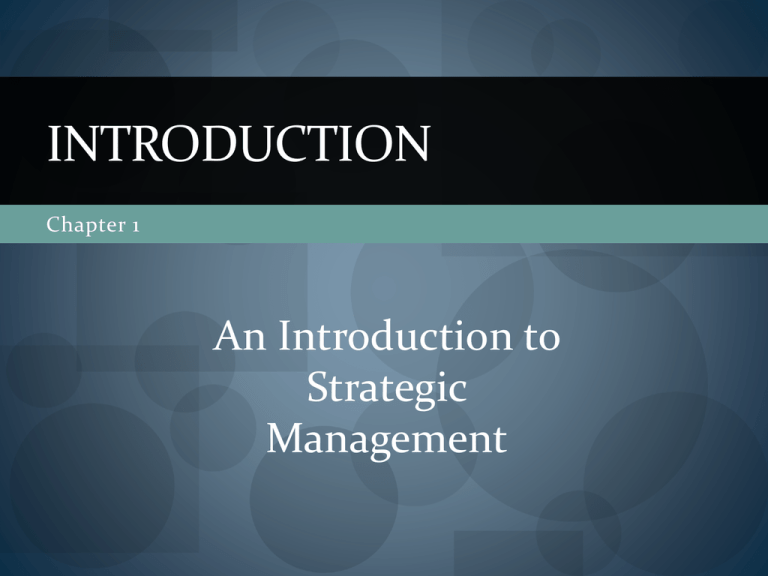
INTRODUCTION Chapter 1 An Introduction to Strategic Management Two Success Stories… Coca Cola and Southwest Airlines What makes them so successful? Coca Cola Southwest Airlines Product Breadth Customer Focus Distribution Distinct Culture Capabilities Branding Product Positioning Strong Leadership Low Costs Unique Operating Structure Limited Competitive Exposure Strategic Management… “The definition of the long-run goals and objectives of an enterprise, and the adoption of course of action and the allocation of resources necessary for carrying out these goals.” A. Chandler Strategic Management… “Strategy is the pattern of objectives, purposes or goals and the major policies and plans for achieving these goals, stated in such a way as to define what business the company is in or is to be in and the kind of company it is or is to be.” K. Andrews Strategic Management… “The fundamental pattern of present and planned resource deployments and environmental interactions that indicate how the organization will achieve its objectives.” C. Hofer & D. Schendel Strategic Management… “What business strategy is all about is, in a word, competitive advantage… the sole purpose of strategic planning is to enable a company to gain, as efficiently as possible, a sustainable edge over its competitors.” K. Ohmae Strategic Management… “An integrated and coordinated set of commitments and actions designed to exploit core competencies and gain competitive advantage.” R. Hoskisson, M. Hitt, & D. Ireland Strategic Management… “Strategy is a set of important decisions derived from a systematic decision making process, conducted at the highest levels of the organization.” D. Gilbert, E. Hartman, J. Mauriel, & E. Freeman Strategic Management… A framework for analyzing the environment, for integrating the firm’s activities, for learning and adapting to change, and for creating value both in the present and into the future. Strategic Management… What is the common thread running through these definitions? Creating Value Strategic Management… Mintzberg’s 5 Ps of Strategy Plan Perspective Ploy Competitive Advantage Position Pattern Mintzberg’s 5 Ps of Strategy Plan-a consciously-intended course of action; a guideline to deal with a situation E.g.-a plan to enter a new market Ploy-a specific maneuver designed to outwit an opponent or competitor E.g.-threatening to expand facilities to keep a competitor from entering a market Plans = general strategies Ploy = competitor-specific strategy Mintzberg’s 5 Ps of Strategy Pattern-a consistent pattern of behavior Intended behavior or not May be the result of learned strategy over time “Gradually the successful approaches merge into a pattern of action that becomes our strategy. We certainly don’t have an overall strategy on this.” NUMMI… “is another example of how GM’s strategy boils down to doing a little bit of everything until the market decides where it is going.” Mintzberg’s 5 Ps of Strategy Strategies about what? Mintzberg’s 5 Ps of Strategy Position-location of a firm in the environment; match between firm and environment Compatible any preceding definition of strategy Essence of many contingency and configurations theory approaches to strategy Perspective-how an organization and its managers perceive the environment; a perspective shared by members of the organization Dominant logic = TMT shared mental model Strategic Management is… Strategic management is that process by which managers formulate and integrate the firm’s functions into streams and patterns of action designed to fit the constraints and demands of the market. Key components of this definition Continual process, not a state or thing Formulate and integrate = develop and implement Managers must fit the firm’s functions with both internal and external constraints Competitive Advantage… “Grows out of the value a firm is able to create for its buyers that exceeds the firm’s cost of creating it.” M. Porter Competitive Advantage… Competitive advantage is the reason a customer chooses to transact with and pay a profitable price to a particular firm. Competitive Advantage Marginalism People tend to maximize marginal utility as opposed to total utility They make “decisions on the margin” Requires firms to “pay attention to the details” Methodological Individualism-social phenomena can only be understood through examining the individual motivations and actions of individuals Two important distinctions of CA Quest for competitive advantage is never ending Competitors are not always known Competitive Advantage… • Episodic and specific to context and situation. • Identified and evidenced through customer action. • Directly related to value creation, value appropriation, and performance. Creating Value… Customer Value Consumer Surplus This area represents the value created in each profitable sale and consists of both profit to the firm and surplus to the customer. Selling Price Profit Total Cost to the Firm KEY Adopting and adapting a strategy or strategies that balance firm costs, profit, and overall value for customers This area represents the firm’s total costs in presenting the product or service for sale. To create new value, the firm must cover its total costs. The SWOT Framework & Analysis… Internal to organization: a unique bundle of valuable resources: Strength Weakness External to organization: forces that affect firm behavior and performance: Opportunities Threats
